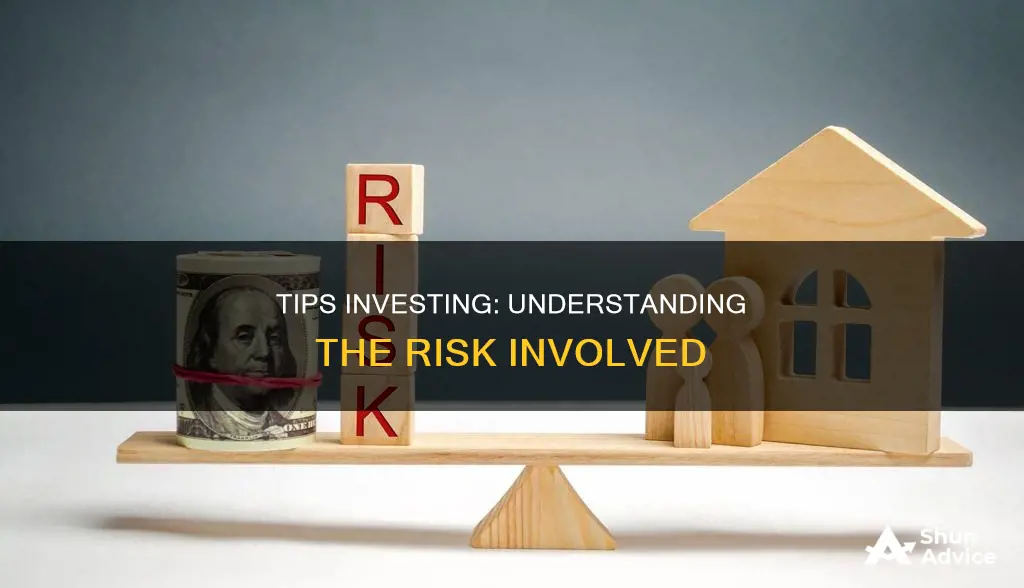
Treasury Inflation-Protected Securities (TIPS) are seen as being free of credit risk, as they are backed by the full faith and credit of the United States government. However, there are several risks associated with investing in TIPS. Firstly, TIPS are highly sensitive to interest rate movements, which can cause the value of a TIPS mutual fund or ETF to fluctuate widely in a short period. Secondly, there is the risk that the official CPI fails to track actual inflation or the rising prices of the products or services the investor needs. Finally, since bond funds have no maturity date, investors are not guaranteed to see a full return of principal.
| Characteristics | Values |
|---|---|
| Interest-rate risk | TIPS are highly sensitive to changes in interest rates |
| Inflation risk | The official CPI may fail to track actual inflation or the rising prices of the products or services the investor needs |
| Credit risk | TIPS are backed by the full faith and credit of the United States government, so investors are guaranteed to receive all interest and principal |
| Maturity risk | Investors who hold TIPS via mutual funds or ETFs are not guaranteed to see a full return of principal |

Interest-rate risk
TIPS are highly sensitive to interest rate movements, which means they carry a high level of interest-rate risk. Like other bonds, the principal value of TIPS declines during periods of rising interest rates, and this may or may not be offset by adjustments for higher inflation.
TIPS are backed by the full faith and credit of the United States government, so they are seen as being free of credit risk. Investors are guaranteed to receive all of the interest and principal that’s coming to them. However, the price of a TIPS bond will fluctuate between the time when it is issued and the date at which it matures.
Those who hold TIPS via mutual funds or ETFs face a different set of risks. Funds do provide an element of inflation protection in the sense that the principal value of the bonds held by the funds will adjust upward with inflation. However, unlike individual securities, bond funds have no maturity date. This means that investors are not guaranteed to see a full return of principal.
India's Investment in Chabahar: Exploring Strategic Interests
You may want to see also

Inflation risk
TIPS (Treasury Inflation-Protected Securities) are considered to be free of credit risk because they are backed by the US government. This means that investors are guaranteed to receive all the interest and principal that's coming to them. However, there are still risks associated with investing in TIPS, including inflation risk.
While TIPS do provide some inflation protection, this is not guaranteed. The principal value of the bonds will adjust upward with inflation, but this may not keep pace with the actual rate of inflation or the rising prices of the products or services the investor needs. This means that investors could still lose purchasing power even when investing in TIPS.
Additionally, TIPS held via mutual funds or ETFs face a different set of risks compared to individual bonds. Mutual funds and ETFs have no maturity date, so investors are not guaranteed to see a full return of principal. This means that investors could lose money if they sell their TIPS holdings before the bonds mature.
Investing in India: A Guide for NRIs in America
You may want to see also

Credit risk
Since TIPS are backed by the full faith and credit of the United States government, they are seen as being free of credit risk. This means that investors are guaranteed to receive all of the interest and principal that they are owed.
However, TIPS are not without their risks. For example, TIPS are highly sensitive to interest rate movements, and their principal value declines during periods of rising interest rates. This interest-rate risk can be particularly pronounced for TIPS because issuance has historically been weighted more toward longer-term bonds; as a result, most TIPS benchmarks have relatively long durations. On the extreme end, TIPS with maturities of 10 years and more have lost as much as 41% of their value during interest-rate spikes.
Another potential risk of TIPS is that the official CPI fails to track actual inflation or the rising prices of the products or services the investor needs. While TIPS will work as intended for investors who buy individual bonds and hold them to maturity, those who hold TIPS via mutual funds or ETFs face an entirely different set of risks. Funds do provide an element of inflation protection in the sense that the principal value of the bonds held by the funds will adjust upward with inflation. However, unlike individual securities, bond funds have no maturity date. This means that investors are not guaranteed to see a full return of principal.
Additionally, since the price of a TIPS bond will fluctuate between the time when it is issued and the date at which it matures, a person who sells a bond prior to its maturity date may be affected by these price movements.
Explore Careers in Investment Management: Job Opportunities Abound
You may want to see also

Maturity date risk
TIPS are highly sensitive to interest rate movements, which can cause the value of a TIPS mutual fund or ETF to fluctuate widely in a very short period. This is because the principal value of TIPS declines during periods of rising interest rates, which may or may not be offset by adjustments for higher inflation.
TIPS with maturities of 10 years or more have lost as much as 41% of their value during interest rate spikes. This is because issuance has historically been weighted more toward longer-term bonds, resulting in most TIPS benchmarks having relatively long durations.
While TIPS will work as intended for investors who buy individual bonds and hold them to maturity, those who hold TIPS via mutual funds or ETFs face a different set of risks. Funds do provide an element of inflation protection in the sense that the principal value of the bonds held by the funds will adjust upward with inflation. However, unlike individual securities, bond funds have no maturity date. This means that investors are not guaranteed to see a full return of principal.
Since TIPS are backed by the full faith and credit of the United States government, they are seen as being free of credit risk. Investors are guaranteed to receive all of the interest and principal that’s coming to them. While the price of a TIPS bond will fluctuate between the time when it is issued and the date at which it matures, a person who holds until maturity isn’t affected by these price movements. However, this moderate level of volatility does have the potential to become an issue if a person sells a bond prior to its maturity date.
Invest Safely in India: A Guide to Smart Investing
You may want to see also

Liquidity risk
Additionally, TIPS are highly sensitive to interest rate movements, which can further impact liquidity. During periods of rising interest rates, the principal value of TIPS tends to decline, and this may not be fully offset by adjustments for higher inflation. As a result, investors may find it challenging to sell their TIPS holdings at a favourable price, leading to liquidity risk.
The interest-rate risk associated with TIPS is particularly pronounced due to the historical weighting of issuance towards longer-term bonds. Consequently, most TIPS benchmarks have relatively long durations, increasing the potential for significant value fluctuations during interest-rate spikes. For example, TIPS with maturities of 10 years or more have experienced substantial losses of up to 41% of their value during interest-rate spikes.
It is worth noting that liquidity risk in TIPS can be mitigated to some extent by holding individual bonds until maturity. However, investors who choose to hold TIPS via mutual funds or ETFs face a different set of risks. Unlike individual securities, bond funds do not have a maturity date, meaning investors are not guaranteed a full return of principal. Therefore, the liquidity risk in TIPS investments is closely tied to the sensitivity of these securities to interest rate changes and the potential for losses if sold before maturity.
Borrowing to Invest: Is It Worth the Risk?
You may want to see also
Frequently asked questions
TIPS are highly sensitive to changes in interest rates, which can cause their principal value to decline. They are also subject to market, issuer, credit, inflation and liquidity risk.
Investors who hold TIPS via mutual funds or ETFs are not guaranteed to see a full return of principal because, unlike individual securities, bond funds have no maturity date.
While TIPS are seen as being free of credit risk, the price of a TIPS bond will fluctuate between the time when it is issued and the date at which it matures. This means that if you sell a bond prior to its maturity date, you may be affected by these price movements.
TIPS will work as intended for investors who buy individual bonds and hold them to maturity. However, it is important to note that you are not guaranteed to receive the bond's par value since its market price could be more or less than par at the time of sale.
If the official CPI fails to track actual inflation or the rising prices of the products or services the investor needs, then the value of a TIPS investment may not keep up with the rate of inflation.







